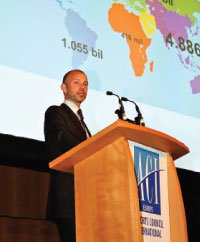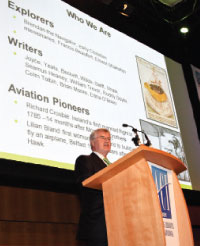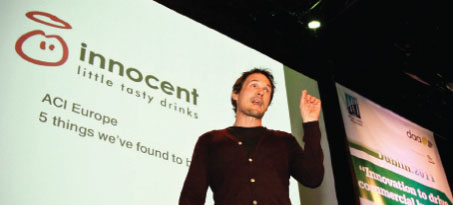
ACI EUROPE Director General Olivier Jankovec referred to the capacity crunch, with air traffic set to double by 2030. While there will be a 41% capacity increase, 11% of demand will be unaccommodated, leading to unprecedented congestion.
The travel retail industry has come a long way since 1947, growing to global revenues of US$39 billion (€27bn) last year – up +13% on 2009, and indeed a record that exceeds the 2008 pre-recession total. The impressive attendance of more than 350 delegates highlights the importance of commercial revenues to the business models of airports of all sizes.
The event addressed a broad range of topics, such as technology advancement to drive revenues, and evaluating the different commercial models for airports, concessionaires and brands. Regulatory issues were also high on the agenda; while the opportunities for the travel retail industry are many, so are the challenges, such as the single bag carry-on rule and the threat to duty free tobacco sales.
Declan Collier, CEO, Dublin Airport Authority, and Filip Soete, Marketing and Operational Communications Director, Aéroport Nice Côte d’Azur and Chairman, ACI EUROPE Commercial Forum, delivered the welcome addresses. “Retail is in our DNA; duty free was invented at Shannon Airport in 1947,” said Collier, adding that Dublin’s new Terminal 2 sets “a new standard for travel retail”.
Dublin Airport is an important national asset for the Irish economy, handling 75% of all air traffic into the Irish Republic. Ireland is also one of the world’s most open economies, exporting 82% of its annual GDP. The major capital investment programme to transform Dublin Airport saw €1.2 billion invested between 2006 and 2010, and Collier explained that a planning application for a new parallel runway will be lodged in 2011 to provide additional capacity and direct long-haul connectivity.
Soete cited some interesting ACI EUROPE statistics – for example, up to 60% of airport revenues come from non-aeronautical activity, and the estimated non-aeronautical revenues of European airports total €12 billion annually. “Today, non-aeronautical revenues are strategically important for airports,” commented Soete. “We must drive innovation and have the ‘wow’ factor; Dublin’s Terminal 2 has this.”
ACI EUROPE Director General Olivier Jankovec delivered a detailed State of the Industry address, looking at areas such as recovery from the economic crisis; changing market structure – with the growing market share of the low-cost carriers to reach +50% in 2013, and airline consolidation; changing traffic patterns; and the four key challenges of security, connectivity, capacity and the environment.
Jankovec referred to the capacity crunch, with demand for air travel set to double in Europe by 2030. While there will be a 41% capacity increase, 11% of demand will be unaccommodated, leading to unprecedented congestion. Airports must be given the licence to grow, and be incentivised to finance development, Jankovec reiterated, while on challenges such as the threat to duty free tobacco sales and the one bag rule, ACI EUROPE’s full cooperation with the European Travel Retail Council (ETRC) was assured.
Richard Reed, co-founder of Innocent, the British fruit drink and ‘smoothie’ maker, gave a truly inspirational keynote address, with a perspective from outside the industry. Reed presented five key lessons: 1. Having a mission helps – “The most successful companies are clear on why they are here”; 2. Things that start small can get big (and small again); 3. It’s about people – Innocent has a reward philosophy, which Reed described as “something for everyone and the most for the best – we’re fans of the small things that can make a big difference”; 4. The details can make a difference; 5. Listening is free and creates value – “We take the opportunity to chat with our consumers.”
Challenges facing travel retail

“Retail is in our DNA; duty free was invented at Shannon Airport in 1947,” said Declan Collier, CEO, Dublin Airport Authority, adding that Dublin’s new Terminal 2 sets “a new standard for travel retail”.
Frank O’Connell, president, ETRC, provided a comprehensive breakdown of the political challenges facing travel retail. Under the one bag policy adopted by some low-cost carriers, a fine is imposed on passengers for every item they carry beyond a single piece of cabin baggage. “There is no exemption for travel retail purchases and rigorous enforcement at certain airports,” commented O’Connell. “However, enforcement of the policy varies from airport to airport. It poses a threat to duty free and travel retail, as passengers who are uncertain about the ability to carry on purchases, will not make purchases.”
Where fully enforced, the one bag rule has resulted in a drop of up to -40% in sales. It is particularly challenging for certain product categories, such as liquor, in which the items can be bulky. O’Connell emphasised the need to defend passenger rights. He commended Spanish legislation that allows passengers to carry on items purchased within airport retail, in order to avoid prejudicing passenger rights and airport commercial activity, describing this as a brave approach and a lesson for other governments across Europe.
The World Health Organization Framework Convention on Tobacco Control is being reviewed in certain key areas. O’Connell explained that an Intergovernmental Negotiating Body is examining the area of illicit trade, while a Working Group has been established to examine Taxation Policies. “Pressure is applied by NGOs and certain States to ban duty free sales of tobacco. The current wording of the illicit trade protocol includes a restatement of the right to ban duty free. There is a risk that wording may be altered later in the negotiating process,” said O’Connell.
‘Differentiating the product’
The consensus across the conference was that innovation is vital. London Heathrow’s slogan is ‘Making every journey better’, and John Holland-Kaye, commercial director, BAA, outlined how the operator is using Customer Relationship Marketing (CRM) to increase retail spend. “The emphasis is on ‘relationship’,” he said. BAA’s Worldpoints reward scheme has 250,000 members and, according to Holland-Kaye, generates £2 million (€2.3m) per year. “As a reward scheme it works. Worldpoints members spend 7% more per year than non-members,” he said. Other initiatives include Reserve & Collect and the Heathrow iPhone App, which generates instant feedback from passengers.

Richard Reed, co-founder of Innocent, the British fruit drink and ‘smoothie’ maker, gave a truly inspirational keynote address, with a perspective from outside the industry.
According to Ezio Balarini, group chief marketing officer, Autogrill: “F&B and retail are critical revenue generators for modern airports because they’re among the most important passenger needs.” He provided details of ‘Contentainment’ – a form of digital retail theatre in which retailers, brands and landlords work in partnership. Balarini also referred to precision targeting, which he said involves identifying “the key destinations by terminal for each brand, ensuring we have the right product, with the right message in the right place at the right time”.
There is no one-size-fits-all model for airport commercial activity. What is important, according to Doug Benham, Head of Commercial, MAp Airports, is focusing on the retail experience. “Differentiating the product, embracing technology, the impact of e-commerce and mobile technologies are all important,” he said.
Jean-Baptiste Morin, SDA Chairman and Chairman & CEO, Aelia, added that the trinity of airport, operator and supplier, and the relationship between the three is vital. “The concession agreement is a key element of the relationship. Commercial agreements drive revenue performance,” he said.
Meanwhile, Jack MacGowan, Chief Commercial Officer, Dublin Airport Authority, stressed the importance of airport pricing. “Pricing is the way consumers judge if you’re trustworthy,” he said. “If the price meets their expectation, you get a sale. Value for money is all-important.”
Unconference
This year’s event also saw the introduction of the innovative Unconference session, in which the conference room broke out into five working areas, focusing on Fashion Retail, Currency Exchange and VAT Refund, Food & Beverage, Parking and e-Commerce. It was widely heralded as a successful initiative that increased the level of debate and provided an effective forum for open discussion.
The conference highlighted both the opportunities and challenges facing travel retail, as airports seek to maximise revenues. It is clear that creativity and innovation are key to future success, and Europe’s airports, concessionaires and brands have the skills and the imagination to deliver great retail.
Oslo 2012
The 21st ACI EUROPE Airport Trading Conference and Exhibition, hosted by Oslo Airport, will take place in Oslo from 23-25 April 2012. Oslo is both an appealing tourist destination and a reference site for airport commercial activity. The airport is developing its new Terminal 2, which will be complete in 2017.







